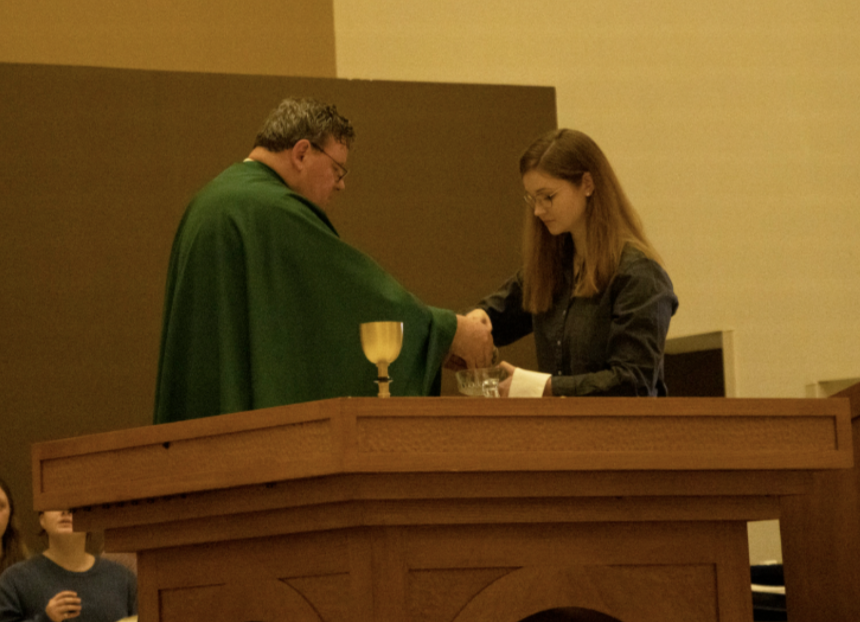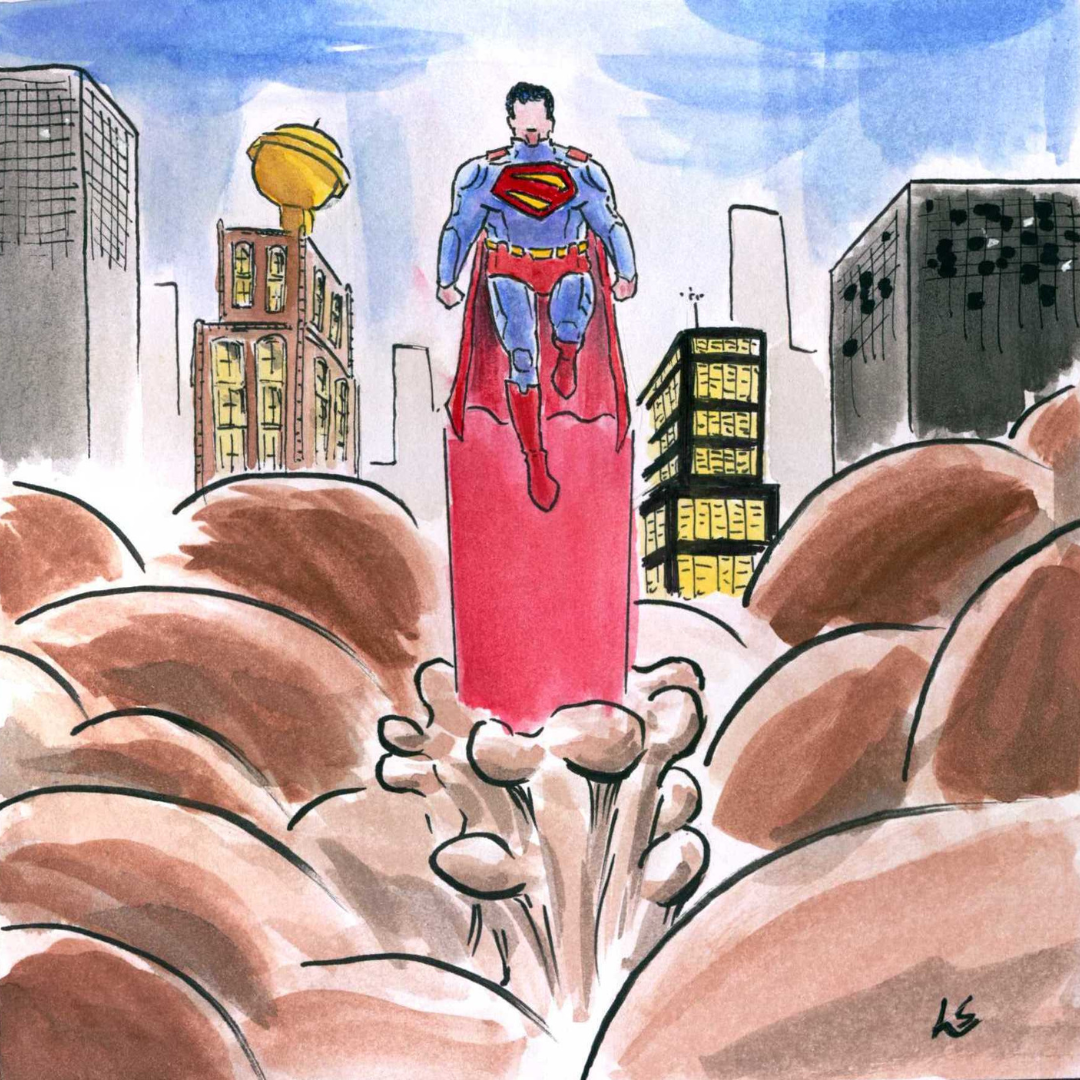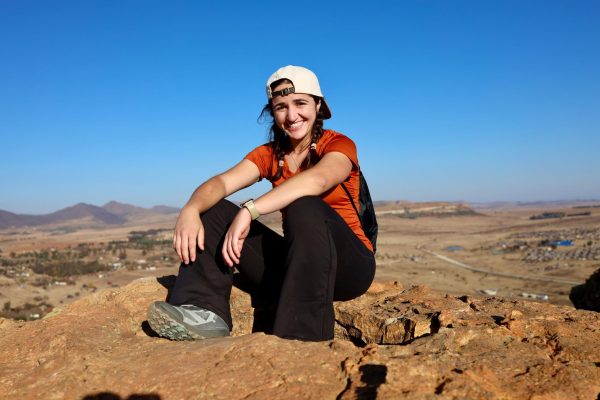It was at the Nazareth School in Warsaw, Poland where a love of Jesus and physics collided for Julia Oseka ’25.
“I love proving that those two are not mutually exclusive,” Oseka said, as her bright blue eyes sparkled in the sunlight coming through her window in LaFarge Residence Hall.
Oseka, an international student from Sobienie Jeziory, Poland, is the only female physics scholar in the university’s prestigious John P. McNulty Program, which awards scholarships to women in STEM and hosts leadership training and professional development workshops. She also is a resident assistant in LaFarge Hall and peer minister for Campus Ministry.
As a physics major with a theology and religious studies minor, Oseka said her studies have helped shape her perspectives in life. She applies her analytical way of thinking from the physics classroom to her theology classes. To see the full scope of what is being taught, she stays curious and strips herself of any bias.
“Scientific people often lack empathy towards those who have different opinions, while religious people often lack the objectiveness to look at a scenario differently,” Osaka said.
With an understanding of both, Oseka said she is able to problem-solve more efficiently and objectively.
But applying this more analytical mindset has led to frustration. Oseka gave a speech at a synodal meeting at LaSalle University, a meeting where local church leaders gathered with students to listen to their experiences of being part of the Catholic Church. Oseka drew from experiences she learned in the classroom to advocate for the roles of women and LGBTQIA+ individuals in the church.
“Even saying something that has implicitly nothing wrong with it, you’re judged because it’s against the tradition,” Oseka said. “It’s like a bucket of really cold water being poured on you.”
Tinamarie Stolz, a campus minister, has worked extensively with Oseka, mentoring her as a liturgy peer minister and accompanying her to the synod meeting at LaSalle University, as well as the Ignatian Family Teach-In for Justice in Washington D.C., which is a conference where members of the church gather to discuss social justice issues.
“I look at [Oseka] and want to say to the church, ‘do you want to lose somebody like that?’” Stolz said. “Do you want to lose somebody who’s able to love like she loves, is able to lead like she leads?”
Oseka identifies herself as an active feminist in the church.
“I’m not trying to fight people,” Oseka said. “I’m just trying to utilize the laws that have been changed, and I want to take advantage of them.”
Those laws include a modification of the Code of Canon Law that Pope Francis mandated in 2021, allowing women to be lectors and acolytes in churches. Oseka performs all the duties of an acolyte at the Chapel of St. Joseph, while in Poland, she was never allowed to even be an altar server.
In the physics lab, Oseka faces similar struggles.
“Being a woman trying to pursue a degree in STEM is hard on its own,” Oseka said. “There’s prejudice against me, because, when people in the lab discover I study theology, they think that I am ignorant or conservative and allow my beliefs to guide my rationale.”
The conversation shifted again when asked who her role model is. Oseka rested her hands on her knees and looked up in thought. “Dr. Julie Deluty,” Oseka said.
Julie B. Deluty, Ph.D., assistant professor of religious studies, was Oseka’s first college-level religious studies professor for a Hebrew Bible class. Oseka described Deluty as “successful, compassionate, empathetic and intellectually stimulating.”
“I adored her classes because they made me think more intensely than my physics classes freshman year,” Oseka said.
Deluty remembered an assignment Oseka wrote for class where she responded to an event that was hosted by the Institute for Jewish-Catholic Relations, where Biblical scholars of Catholic, Jewish and Protestant faiths discussed how to read religious texts critically.
“[Oseka] appreciated how the scholars were able to derive inspiration from the Bible in their own lives, but also explain, and this was important, that not every interpretation goes,” Deluty said. “There are constraints, and what [Oseka] zoomed in on in her response was how a lot is lost in translation.”
Oseka dreams of being a physics professor one day and aspires to leave the same impression on other students that Deluty had on her. She said she hopes more people could understand the mutual benefits that religion and science can offer to each other, and most importantly, she hopes that women continue to push for equal treatment in both fields.
“I want to be so successful and impressive academically, not to other people, but to myself,” Oseka said. “And at the same time, I want to be such a good person to my students in the future.”















































